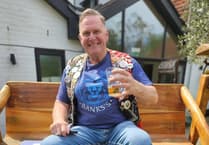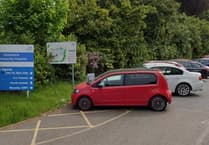A HASLEMERE woman has gone out to Poland and is using her knowledge and skills to provide trauma-based therapy for Ukrainian refugees.
Aga Kehinde – who works at the Royal Surrey County Hospital – arrived in Slupsk last week and is working on the Support for Slupsk project.
She has already met with Slupsk vice-president Marta Makuch, as well as representatives of local services providers including social services, local and regional educational psychologists, mental health services and educational leaders.
Aga presented the vision and mission of the Support for Slupsk project and discussed the current challenges and needs related to supporting Slupsk and the Ukrainian refugee community in healthy and meaningful integration.
Aga said: “Those I met with are doing their best to help and support the refugees arriving in the town, but – having not experienced this situation before – they are not equipped with the knowledge or training to support traumatised communities and individuals.
“This is especially important when it comes to children, who are joining schools and need to assimilate in a rapid way to new environments.
“From the discussions I’ve had with the local leaders and community, it’s clear there is ongoing pressure on local and regional services and systems, a risk of compassionate fatigue, and an enduring feeling of uncertainty and inability to predict how long this situation will last.”
Aga – who is on a four-month sabbatical from her job at the Royal Surrey County Hospital – is providing trauma-based support, education and training for the emergency services, aid workers, and communities in Slupsk involved with assisting the incoming Ukrainian refugee population.
She said: “When the war broke in Ukraine I could see there would be a clear need for Ukrainian refugees and the Polish community to have trauma-based therapy.
“I’ve got friends and family in Slupsk and they don’t know what to do – there is a lot of trauma.”
Local services providers in Slupsk have agreed that in order to facilitate the long-term plan of community integration it is necessary to work equally with both the Polish and Ukrainian communities to make healing a collective effort.
Slupsk leaders recognised the trauma-based therapy model proposed by Aga.
It involves working with refugees in a therapeutic way – offering them tools to process their collective traumatic experience – but also educating and equipping local service and care providers with the same tools, so both communities become resourceful and ready to deal with post-traumatic consequences on all aspects of life.
Aga has organised two months of intense work, scheduling regular three-hour workshops, often two times a day.
The first Support for Slupsk workshop took place on Tuesday – and Aga has recruited volunteer Marta Nosewicz to support her in the initial delivery of the workshops.
Tuesday’s stress and trauma education session was held with a group of 17 participants who work mostly with children. The group included therapists, psychologists and an educational psychologist.
Aga has also started a conversation with the local refugee centre to develop workshops for Ukrainian children, with volunteers coming later in the summer to support her on this part of the project.
Aga is raising money for her trauma-based work in Slupsk, to help pay for translators and other costs. Anyone who would like to donate should visit Aga’s GoFundMe at: https://www.gofundme.com/f/Support-for-Slupsk





Comments
This article has no comments yet. Be the first to leave a comment.